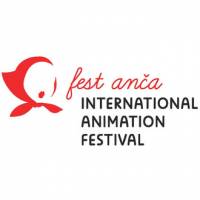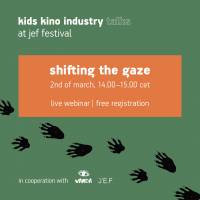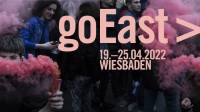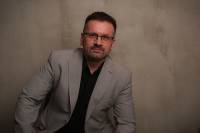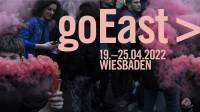The 15th Fest Anča International Animation Festival has announced its selection of animated short films! More than 1,250 films from 68 countries from all over the world have been submitted to the festival this year. The selection features films from both familiar and fresh creators. It is an overview of the best of world and domestic animation, encompassing varied animation techniques, authors’ unique styles and diverse themes.
Only one sixth of films submitted to Fest Anča 2022 make it through to the festival’s official selection. “We received many high-quality animated short films. It was difficult to choose, and unfortunately many good films missed out,” stated programme dramaturge Jakub Spevák and festival director Ivana Sujová in unanimously evaluating the quality of submitted films.
Both familiar and fresh creators
In the competition and non-competition sections, animation fans will recognize some names from previous editions of Fest Anča. These include former guests and award winners (Peter Millard, Koji Yamamura, Sarina Nihei, Steven Subotnick), as well as Chilean directors (Cristóbal León and Joaquín Cociña) who were jury members last year and this time will present their film The Bones in the World Panorama. Audiences can look forward to animated videos by Raman Djafari, and abstract animation by Hungarian animator Réka Bucsi.
The competition section will feature the porcelain animation Beast, which was also Oscar-nominated this year. Inspired by true events, the film depicts the story of a secret police agent during the military dictatorship. The pre-selection committee was intrigued by the film with the copious title In My Chest of Fire There Is Still Place to Temple Your Dagger: A Love Story, which is a distinctive retelling of the relationship between Ash and Pikachu. The selection also includes Imaginary Landscapes by renowned Ukrainian animator Mykyta Lyskov.
A third of the main competition comprises student films. For example, Wet depicts the recesses of a sauna, guiding viewers through a labyrinth of sensuality, bodies and steam. Student films are also represented in the Slovak competition. These include r a u u by Zlata Golecová, a recent graduate of the Academy of Performing Arts, who used various animation techniques to portray a story about a mysterious character.
Slovaks on screen
Slovak films are also represented in the international selection. Once There Was a Sea…. by Joanna Kożuch (which has already won the Student Jury Prize at the Clermont-Ferrand Festival) has been selected for the main and Slovak competition. Love, Dad, an animated Slovak co-production documentary about the relationship between a daughter and her father by Diana Cam Van Nguyen is part of the main competition as well. Another Slovak co-production, Suzie in the Garden (which premiered at the prestigious Berlinale 2022), will be presented in the World Panorama section.
As for the Slovak section, the pre-selection committee commented on its quality: “This year we are presenting a very balanced and diverse competition section. We’re interested to see which film appeals most to our jury.”
Video killed the radio star
Slovakia is also represented in the music video competition with animators Milan Stanco (Charms Kids: Les Miserables) and Marián Vredík (Queer Jane: Gerard Love). “It’s great that the music video competition is consistently high-quality - different musical styles and imaginative animations,” says dramaturg Jakub Spevák. The music video section will also feature animation by Sarina Nihei, the winner of last year's Anča Award for Best Animation.
Kids love films too!
At Fest Anča children and their parents can look forward to one competition and two non-competition sections of the best films for children. This international section is full of the fun, education, creative approaches, imaginative artistic stylizations, and original techniques that only animated film can offer children.
“We are happy to show films that have an equal dialogue with children and stimulate their imagination,” says Ivana Sujová. For example, the competition section’s Elevator Alone is the story of four characters who behave differently in an elevator when alone and together. This humorous puppet animation touches on the individual-group relationship in a playful and child-friendly way. In the non-competition children's section, Slovak animator Filip Diviak’s Sounds Between the Crowns has also been selected.
In conclusion
As regular visitors know, Fest Anča also includes a number of specialised sections such as Anča in Mordor and Anča in Wonderland. And this year the festival will again feature a Short Animated Documentary section, as well as an extremely short film section dedicated to extremely short films.
Every year the festival presents films premiering in Slovakia. “So viewers have the unique opportunity to watch most films for the very first time,” concludes Ivana Sujová.
The festival annually includes an international competition of animated short films and music videos, as well as thematic and special focused film sections. Over its four days, Fest Anča offers lectures, exhibitions, workshops, screenings for children, and many accompanying events.
More information at:
festanca.sk
facebook.com/festanca
twitter.com/festanca
www.instagram.com/fest_anca
vimeo.com/festanca
photos from past edition
The animation industry will be trained in Łódź! Recruitment to StopMoLab has started
Press releases 21-03-2022Master workshops, talks, case studies, mentoring and lectures are part of StopMoLab, an international training program for the stop-motion animation industry. 9 months of intensive work and study will be provided by a group of top-class specialists and professionals who are associated with such productions as "Corpse Bride", "My Life as a Zucchini" or "The Red Turtle". StopMoLab is the latest professional education project of the Poland-based company Momakin. Applications can be submitted until March 27 at www.stopmo.pl.
How does the modern animated film market work? Where are they and how to apply for artistic residencies? What does an eco-friendly film production process look like? These are just a few topics that will be covered during the intensive educational course for beginner stop-motion animation creators. StopMoLab will start in April and will run for 9 months. The program is exclusive with only 25 seats, for 5 people of each profession: animators, puppet makers, production managers, art directors and screenwriters.
– The project fills the natural gap between the knowledge gained in art schools and the realities of functioning in the contemporary animation industry. – says Paulina Zacharek from Momakin, the creator of StopMoLab project – It gives participants a few additional months to recognize and find their path in the industry.
SKILLS, BUSINESS and GO GREEN are three keywords and, at the same time, modules to which the program is subordinated. Improving your skills, discovering new trends, business models and the topic of pro-ecological activities are the most important directions in the development of the animation industry. The course has been created and will be conducted by specialists and professionals working daily in the production of stop-motion animation. The program board includes such masters as Francesca Berlingieri Maxwell (known, among others, from "Corpse Bride", "ParaNorman" or "Fantastic Mr. Fox"), Denis Walgenwitz (associated with such productions as Oscar-nominated "Red Turtle", "My Life as a Zucchini" or "Despicable Me"), Angela Poshet (working on such films as "Isle of Dogs" or Oscar-nominated "Frankenweenie") or Tim Allen and Magdalena Bieszczak (both currently working on the production of "Pinocchio" directed by Guillermo del Toro). StopMoLab is a whole lot of hours of mentoring meetings, lectures, case studies, master workshops and lectures. The course will be conducted online and offline in Lodz through an extensive online platform.
– In Łódź, in a place associated with animation for years, where Oscar-winning productions of "Peter and the Wolf" or "Tango" were created, we will meet twice – says Paulina Zacharek – once in July and the second time during the ANIMARKT Stop Motion Forum.
Recruitment to StopMoLab has two stages, in the first stage the candidate's application will be assessed by a specialist on behalf of the profession and industry representative in the field of business development, and the second step will be an online interview. Participation is paid in the amount of EUR 500 for the entire course. More information about the project and the registration form can be found at www.stopmo.pl. StopMoLab is co-financed by the European Union from the Creative Europe Media program.
The event is organised by MOMAKIN, a company connecting the world of animated filmmakers with the international production, distribution and promotion market, which specialises in stop motion projects. It supports animation projects at every stage of their development: from planning and financing, through production, to distribution. It deals with the education and professional education of the film industry.
Who will get the most Czech Lion statuettes? We will find out on Saturday 5th March. The tragicomic drama Occupation by Michal Nohejl and the biographic drama Zátopek directed, produced and co-written by David Ondříček can both boast of 13 nominations for the Czech Lion awards and thus stand the biggest chances in the 29th year. 11 nominations were given to the fantastic comedy by Martin Šulík The Man with Hare Ears, a film about a man who suddenly obtained some superpowers and those turned his life upside down from day to day. The film Bird Atlas can boast of 9 nominations. It is a dramatic probe of the complicated family relationships and communication technologies directed by Olmo Omerzu. 8 nominations were presented to the film Emma in Love, which is a romantic drama about getting even with your own past directed by Jan Prušinovský. The television series Božena about the first significant Czech female writer directed by Lenka Wimmerová will fight in the last jousting with its 5 nominations and 4 nominations went to the internationally acclaimed animated film My Sunny Maad by Michaela Pavlátová, whose poetic film tells the story of a Czech woman married in Kabul.
In the final jousting altogether 25 films and television works of art will fight for the Czech Lion statuettes in 19 categories. In the first round the academics were choosing from 32 feature actors’ films, then they voted about 16 documentary features that had been chosen by a preselection committee consisting of the members of the academy, 7 animated and 13 short films. As for the collection of the television works of art, which for the second time included also the works distributed via the Internet, the academics were choosing from 16 works of art.
The awarding ceremony of the Czech Lions will take place in the music hall Rudolfinum in Prague and it will be broadcast live by Czech Television on the CT1 channel. It will also be possible to watch it online on www.ceskatelevize.cz/ceskylev. The gala evening will be hosted by Jiří Havelka. The music accompaniment will be provided by the band Blue Shadows led by Petr Ostrouchov.
More information can be found on the website www.ceskylev.cz.
29th CZECH LION – NOMINATIONS
BEST FEATURE ACTORS’ FILM
Atlas ptáků (Bird Atlas) – producer Jiří Konečný
Chyby (Emma in Love) – producers Ondřej Zima, Jan Prušinovský, Zuzana Mistríková, Ľubica Orechovská
Muž se zaječíma ušima (The Man with Hare Ears) – producers Rudolf Biermann, Martin Šulík
Okupace (Occupation) – producers Jan Hlavsa, Julie Žáčková
Zátopek (Zátopek) – producers Kryštof Mucha, David Ondříček
BEST DOCUMENTARY FEATURE
Jednotka intenzivního života (Intensive Life Unit) – directed by Adéla Komrzý – produced by Pavla Janoušková Kubečková
Láska pod kapotou (At Full Throttle)– directed by Miro Remo – produced by Vít Janeček, Miro Remo
Nebe (Heaven)– directed by Tomáš Etzler, Adéla Špaljová – produced by Jan Macola
Nová šichta (A New Shift)– directed by Jindřich Andrš – produced by Augustina Micková, Miloš Lochman, Karel Chvojka
Sny o toulavých kočkách (Dreams about Stray Cats)– directed by David Sís – produced by Vít Bělohradský, Kateřina Bělohradská
BEST DIRECTOR
Atlas ptáků (Bird Atlas) – Olmo Omerzu
Chyby (Emma in Love) – Jan Prušinovský
Muž se zaječíma ušima (The Man with Hare Ears) – Martin Šulík
Okupace (Occupation) – Michal Nohejl
Zátopek (Zátopek) – David Ondříček
BEST ACTRESS IN A LEADING ROLE
Atlas ptáků (Bird Atlas) – Alena Mihulová
Božena (Božena) – Anna Kameníková
Chyby (Emma in Love) – Pavla Gajdošíková
Marťanské lodě (Two Ships) – Eliška Křenková
Zátopek (Zátopek) – Martha Issová
BEST ACTOR IN A LEADING ROLE
Atlas ptáků (Bird Atlas) – Miroslav Donutil
Chyby (Emma in Love) – Jan Jankovský
Muž se zaječíma ušima (The Man with Hare Ears) – Miroslav Krobot
Okupace (Occupation) – Martin Pechlát
Zátopek (Zátopek) – Václav Neužil
BEST ACTRESS IN A SUPPORTING ROLE
Atlas ptáků (Bird Atlas) – Eliška Křenková
Chyby (Emma in Love) – Eva Hacurová
Kukačky (The Swap) – Denisa Barešová
Muž se zaječíma ušima (The Man with Hare Ears) – Zuzana Mauréry
Okupace (Occupation) – Antonie Formanová
BEST ACTOR IN A SUPPORTING ROLE
Atlas ptáků (Bird Atlas) – Martin Pechlát
Muž se zaječíma ušima (The Man with Hare Ears) – Oldřich Kaiser
Okupace (Occupation) – Otakar Brousek
Případ Roubal (Case Roubal) – Hynek Čermák
Zátopek (Zátopek) – Robert Mikluš
BEST SCREENPLAY
Chyby (Emma in Love) – Roman Vojkůvka
Moje slunce Mad (My Sunny Maad) – Ivan Arsenjev
Muž se zaječíma ušima (The Man with Hare Ears) – Marek Leščák, Martin Šulík
Okupace (Occupation) – Marek Šindelka, Vojtěch Mašek
Zátopek (Zátopek) – David Ondříček, Alice Nellis, Jan P. Muchow
BEST CINEMATOGRAPHY
Atlas ptáků (Bird Atlas) – Lukáš Milota
Lidi krve (Blood Kin) – Jakub Halousek
Muž se zaječíma ušima (The Man with Hare Ears) – Martin Štrba
Okupace (Occupation) – Jan Baset Střítežský
Zátopek (Zátopek) – Štěpán Kučera
BEST FILM EDITING
Atlas ptáků (Bird Atlas) – Jana Vlčková
Chyby (Emma in Love) – Michal Böhm
Láska pod kapotou (At Full Throttle) – Šimon Hájek
Okupace (Occupation) – Petr Turyna
Zátopek (Zátopek) – Jarosław Kamiński
BEST SOUND
Atlas ptáků (Bird Atlas) – Pavel Rejholec, Viktor Ekrt
Moje slunce Mad (My Sunny Maad) – Jan Čeněk, Régis Diebold
Muž se zaječíma ušima (The Man with Hare Ears) – Pavel Rejholec, Viktor Ekrt
Okupace (Occupation) – Sandra Klouzová, David Titěra, Roman Sečkař
Zátopek (Zátopek) – Pavel Rejholec, Jakub Čech
BEST MUSIC
Divadlo ve filmu: Amerikánka (Theatre in Film: American Chick) – Petr Ostrouchov
Moje slunce Mad (My Sunny Maad) – Evgueni Galperine, Sacha Galperine
Myši patří do nebe (Even Mice Belong in Heaven) – Krzysztof A. Janczak
Okupace (Occupation) – La Petite Sonja, Hank J. Manchini
Zátopek (Zátopek) – Beata Hlavenková
BEST STAGE DESIGN
Božena (Božena) – Petr Kunc
Kryštof (Kryštof) – Milan Býček
Muž se zaječíma ušima (The Man with Hare Ears) – František Lipták
Okupace (Occupation) – Tomáš Svoboda
Zátopek (Zátopek) – Jan Vlasák
BEST COSTUME DESIGN
Božena (Božena) – Katarína Štrbová Bieliková
Muž se zaječíma ušima (The Man with Hare Ears) – Katarína Hollá
Okupace (Occupation) – Josefina Bakošová
Zátopek (Zátopek) – Kateřina Štefková
Zločiny Velké Prahy (The Crimes of Greater Prague) – Simona Rybáková
BEST MAKEUP AND HAIRSTYLING
Božena (Božena) – Martin Valeš
Chyby (Emma in Love) – Jana Bílková
Muž se zaječíma ušima (The Man with Hare Ears) – Martin Jankovič, Katarína Horská
Okupace (Occupation) – Jana Dopitová
Zátopek (Zátopek) – Jana Dopitová
BEST TELEVISION FILM OR MINISERIES
Divadlo ve filmu: Amerikánka (Theatre in Film: American Chick) – main producer Viktor Tauš – main maker Viktor Tauš
Božena (Božena) – main producer Michal Reitler – main maker Lenka Wimmerová
Případ Roubal (Case Roubal) – main producer Pavel Berčík, Ondřej Zima, Michael Bütow – main maker Tereza Kopáčová
BEST TELEVISION DRAMA SERIES
Kukačky (The Swap) – main producers Filip Bobiňski, Petr Šizling, Jan Lekeš – main maker Biser A. Arichtev
Ochránce (The Defender) – main producer Michal Reitler – main makers Tereza Kopáčová, Tomáš Feřtek, Matěj Podzimek
Zločiny Velké Prahy (The Crimes of Greater Prague) – main producer Jan Lekeš – main maker Jaroslav Brabec
BEST ANIMATED FILM
Moje slunce Mad (My Sunny Maad) – director, artist Michaela Pavlátová – producers Kateřina Černá, Petr Oukropec
Myši patří do nebe (Even Mice Belong in Heaven) – directed by Denisa Grimmová, Jan Bubeníček – producers Vladimír Lhoták, Alexandre Charlet – artists Denisa Grimmová, Jan Bubeníček, Jan Kurka
Rudé boty (Red Shoes) – director, artist Anna Podskalská – producer Mária Môťovská
BEST SHORT FILM
Milý tati (Love, Dad) – directed by Diana Cam Van Nguyen – producer Karolína Davidová
Poslední den patriarchátu (The Last Day of Patriarchy) – directed by Olmo Omerzu – producers Rok Biček, Jiří Konečný
Příběh hrůzostrašné Eliz (The Glory of Terrible Eliz) – directed by Eliška Kováříková, Adam Struhala – producers Barbora Skoumalová, Miloš Lochman
MAGNESIA AWARD FOR THE BEST STUDENT FILM – non-statutory award
Dřevo na příští zimu (Wood for the Next Winter) – directed by Karel Šindelář
Ještě nespíš? (Still Awake?) – directed by David Payne
Milý tati (Love, Dad) – directed by Diana Cam Van Nguyen
Postup práce (Progress) – directed by Lun Sevnik
Rudé boty (Red Shoes) – directed by Anna Podskalská
OVERVIEW OF THE NUMBER OF NOMINATIONS (in statutory categories)
Okupace (Occupation) – 13 nominations
Zátopek (Zátopek) – 13 nominations
Muž se zaječíma ušima (The Man with Hare Ears) – 11 nominations
Atlas ptáků (Bird Atlas) – 9 nominations
Chyby (Emma in Love) – 8 nominations
Božena (Božena) – 5 nominations
Moje slunce Mad (My Sunny Maad) – 4 nominations
Divadlo ve filmu: Amerikánka (Theatre in Film: American Chick) – 2 nominations
Kukačky (The Swap) – 2 nominations
Láska pod kapotou (At Full Throttle) – 2 nominations
Myši patří do nebe (Even Mice Belong in Heaven) – 2 nominations
Případ Roubal (Case Roubal) – 2 nominations
Zločiny Velké Prahy (The Crimes of Greater Prague) – 2 nominations
Jednotka intenzivního života (Intensive Life Unit) – 1 nomination
Kryštof (Kryštof) – 1 nomination
Lidi krve (Blood Kin) – 1 nomination
Marťanské lodě (Two Ships) – 1 nomination
Milý tati (Love, Dad) – 1 nomination
Nebe (Heaven) – 1 nomination
Nová šichta (A New Shift) – 1 nomination
Ochránce (The Defender) – 1 nomination
Poslední den patriarchátu (The Last Day of Patriarchy) – 1 nomination
Příběh hrůzostrašné Eliz (The Glory of Terrible Eliz) – 1 nomination
Rudé boty (Red Shoes) – 1 nomination
Sny o toulavých kočkách (Dreams about Stray Cats) – 1 nomination
Awards presented at the press conference on 17th January 2022:
BEST FILM POSTER – non-statutory award
Zátopek – (Zátopek) Aleš Najbrt, Jakub Spurný, Julie Vrabelová – awarded poster
Atlas ptáků (Bird Atlas) – Konstantinos Fragkoulis, Adéla Turková
Moje slunce Mad (My Sunny Maad) – Jan Poukar, Michaela Pavlátová
Okupace (Occupation) – Jindřich Hoch
Vlci na hranicích (Wolves at the Borders) – Jan Němec
AWARD OF FILM FANS – non-statutory award
Zátopek (Zátopek) – David Ondříček (awarded director)
Czech Lion
The Czech Lion is a prestigious Czech film award that has been presented since 1993. Films are evaluated based on the voting of the members of the Czech Film and Television Academy. The ceremonial announcement of the results will take place on Saturday 5th March 2022 in Prague’s Rudolfinum and it will be broadcast live by Czech Television on CT1 at 20:10.
About the Czech Film and Television Academy:
The Czech Film and Television Academy was founded in 1995 and in 2013 it was transformed into a registered association. Its main aim is to support and promote Czech cinematographic art in the Czech Republic as well as abroad and create conditions for the development of Czech film. The academy presents the most prestigious Czech film award – the Czech Lion and nominates the Czech candidates for the awards of the American Academy of Arts and Sciences. The CFTA consists of 353 members at the moment.
PR and press service:
Silvie Marková, Smart Communication | This email address is being protected from spambots. You need JavaScript enabled to view it. | +420 604 748 699
Next Wednesday, KKI Talks returns to JEF Festival. The webinar “Shifting the Gaze” is organised by Kids Kino Industry co-production forum in cooperation with WANDA – Belgian collective of female film creatives & youth film organization JEF.
For this talk we have invited Belgian documentary filmmakers to talk about diversity and original perspectives based on their own experiences. All filmmakers and industry professionals who care about inclusivity and are willing to know more about new Belgian documentary filmmakers are welcome to join us. The participation in the webinar is free of charge, the registration is required (details below).
SHIFTING THE GAZE
online session, March 2, 14-15 CET. Free registration
The world is waiting for new types of stories.
But are we ready to deliver them?
Do we know what exactly is required, both on a narrative and technical level, to season our stories with more diverse protagonists and more original perspectives?
We would like to discuss what happened before, behind and beyond the creation process of new Belgian young audience documentaries with a diverse cast.
When aiming for an inclusive representation in film, how do we deal with technical limitations, realizing that when using a camera, it doesn’t record images without bias, without prejudice, and it certainly is not neutral.
The experience of Florinda Ciucio (“Goals”) and Annabel Verbeke (“Aikiddo”), combined with Rosine Mbakam’s personal story and the researchers’ point of view of An van Dienderen (both directors of “Prism”) will give us a first insight into how we can shift the gaze.
This talk will be moderated by Aminata Demba, actress, presenter and filmmaker and hosted by Viola Gabrielli (Head of Programme, Kids Kino Industry at New Horizons Association) and Iris Verhoeven (Director, JEF).
Free registration
Everyone who would like to join the KKI Talks at JEF Festival, need to fill in the registration form available on Kids Kino Industry website, along with further information about our partners: JEF Festival and WANDA collective, and the bios of our speakers.
Sign up here: https://kidskinoindustry.pl/webinar-registration/.
What if I can’t attend live?
The webinar will be recorded. Once you have registered, you will get the link to the recording straight to your inbox. Although we truly encourage you to join us live, you can always watch our webinar later.
Have you missed previous KKI Talks organised together with JEF Festival and WANDA last year? You can watch it here.
Kids Kino Industry co-production forum
Kids Kino Industry (27-30 September 2022, hybrid) is a part of Kids Kino International Film Festival in Warsaw, Poland, and together with Kids Kino Lab script development workshop and Kids Kino Docs documentary project development workshop creates an offer of initiatives to support development and dissemination of quality kids content. Our goal is to create a meeting place where European professionals can exchange ideas, experiences and develop new content for children. We want to create a space that will help connect projects with potential co-producers, distributors, sales agents, broadcasters and film funds.
The Kids Kino Industry is co-financed by the Creative Europe-MEDIA, Polish Film Institute and the Embassy of the Kingdom of the Netherlands in Poland.
Homage to Lana Gogoberidze // New Developments in the East-West Talent Lab // goEast Welcomes Merck as New Sponsor of VR/XR Competition // Festival Trailer by Radu Jude // Call for Accreditation
Festivals 25-02-2022As the director of a film festival focussing on Eastern Europe, goEast head Heleen Gerritsen cannot refrain from commenting on the current situation at the Russian-Ukrainian border:
"This morning, on 24 February 2022, Vladimir Putin ordered a large-scale attack at Ukraine; targeting cities throughout the whole country. The news leaves us speechless and angry. As a festival dedicated not only to the freedom of arts but also to exchange and dialogue, goEast has shown films from both Ukraine and Russia since its beginnings. It is my deep hope that there will be a de-escalation in the situation soon, and we will see a withdrawal of Russian troops. Our solidarity here, from the entire goEast team, goes out to the people in Ukraine.”
Now, goEast would like to share the following items on its upcoming festival edition:
goEast Homage to Lana Gogoberidze
Women's life stories are her speciality. 93-year-old Lana Gogoberidze made 13 films over the course of six decades and was one of the few female directors in the USSR who didn't reject the Western label of feminism. Lana Gogoberidze, daughter of cinema pioneer Nutsa Gogoberidze and mother of filmmaker Salomé Alexi, is the most significant female filmmaker to emerge from Georgia, and one of the most important of her generation the world over – responsible for international-award-winning works of Soviet cinema from the 1960s on, such as SOME INTERVIEWS ON PERSONAL MATTERS (Ramdenime interviu pirad sakitkhebze, USSR, 1978), DAY IS LONGER THAN NIGHT (Dges game utenebia, USSR, 1983) or WALTZ ON THE PETSCHORA (Valsi pechoraze, Georgia, 1992).
In honour of Lana Gogoberidze, goEast, in co-operation with Frankfurt's Kinothek Asta Nielsen and the Georgian National Film Center, is presenting a retrospective of her work, the first of its kind world-wide. The multifaceted programme, encompassing ten films, features political, feminist and highly autobiographical works, in which, among other things, Gogoberidze grapples with her own family history and the mark left on it by Stalinist terror. goEast looks forward to welcoming Lana Gogoberidze personally to the festival in April, along with her daughter Salomé Alexi, and speaking with her about her work in the scope of an extended Q&A.
Focus on Non-Fiction in the East-West Talent Lab
In 2022, goEast's educational programme for emerging talents is aimed at filmmakers from Central and Eastern Europe, as well as from Germany, seeking an opportunity to further develop their current documentary film projects and extend their peer-to-peer networks. The East-West Talent Lab, co-ordinated by Andrea Wink, supports a total of 30 up-and-coming talents through an intensive workshop programme and one-on-one mentoring for 15 projects, before concluding with a public pitching session in front of a three-member expert jury.
Several prizes are awarded in the scope of the East-West Talent Lab:
- the Renovabis Research Grant, endowed with 3,500 euros in prize money, for a documentary film project with a thematic focus on human rights issues;
- The Current Time Award, endowed with 1,500 euros;
- the Pitch-the-Doc Award, featuring an educational prize package valued at 500 euros.
The festival organisers are delighted to welcome new sponsors for the East-West Talent Lab onboard this year: joining Renovabis, which has been supporting goEast's talent development efforts since 2018, are the Heinrich Böll Foundation and Current Time TV.
Aside from the public pitching session, a further highlight of this year's East-West Talent Lab is a masterclass with Polish director Paweł Łoziński (FATHER AND SON, 2013; YOU HAVE NO IDEA HOW MUCH I LOVE YOU, 2016; THE BALCONY MOVIE, 2021), who will speak to the young filmmakers about his work as a documentary film director. The masterclass is also open to the general public.
Merck Supports New Work-in-Progress Programme for Virtual & Extended Reality
goEast has featured a bespoke competition for virtual reality works since 2018, which has, however, up until now solely shown completed VR projects in Wiesbaden and Frankfurt. Now the festival is set to take on a new challenge – with a programme and accompanying competition exclusively intended for work-in-progress and collaborative projects in the fields of virtual and extended reality:
"The Work-in-Progress Competition is a brilliant opportunity to present Central and Eastern European works to a wider global audience, to honour the most deserving among them and to guarantee a high degree of exposure for the rest of the projects." - Georgy Molodtsov, VR curator at goEast
The declared goal here is to promote new talents from Central and Eastern Europe, as well as students from Germany, who are united by a common passion for VR and XR. Within the programme, the selected participants will receive assistance in their search for further opportunities to fund their projects.
This programme is made possible for goEast thanks to the support of the Darmstadt-based company Merck as a new sponsor, which is endowing the Merck Innovation Award for XR for the first time this year, to be presented by an independent jury. As a leading science and technology enterprise, Merck itself employs VR and XR technology in diverse sectors, and thus wishes to encourage goEast's efforts in the field in the scope of a cultural sponsorship.
"With the new programme and the associated Merck Innovation Award for XR, we would like to support young filmmakers in exploring and developing the potential of these technologies, as we believe that especially in the cultural sphere these new forms of experiencing reality are capable of generating lasting and sustained experiences for the audience," explains Dirk Sulzmann, director of community relations at Merck and responsible for the company's sponsoring activities.
In addition to the work-in-progress programme, in co-operation with teams from Central and Eastern Europe as well as Darmstadt's University of Applied Sciences, the festival will create an interactive goEast environment. In the scope of exhibitions in Darmstadt and Wiesbaden, visitors will be able to experience this creation, alongside a selection of work-in-progress projects.
goEast Trailer 2022: THE RULES OF THE GAME by Radu Jude
Romanian director Radu Jude, Berlinale multi-award-winner (AFERIM!, 2015; BAD LUCK BANGING OR LOONY PORN, 2021), has created the trailer for this year's goEast Film Festival. The nearly one-minute film shows representatives of the Hohenzollern noble family during a hunting trip in Romania, drawn from archival reels from 1935, set to the cheerful tones of waltz music. The whole thing alludes to the hunting scene from Jean Renoir's LA RÈGLE DU JEU (1939). In this piece of found footage, East and West come together symbolically. The trailer can be seen in cinemas in Wiesbaden, Frankfurt, Mainz, Darmstadt and Gießen beginning in March, as well as online on goEast’s various channels from 25 February.
Accreditation
Members of the press can now register here for an accreditation for goEast – Festival of Central and Eastern European Film. During the festival week, accredited industry guests and members of the press receive access to an online media library featuring productions from the festival programme.
You can find images related to the festival in the download section.
The full programme for the 22nd edition of goEast – Festival of Central and Eastern European Film will be announced in late March.
goEast – Festival of Central and Eastern European Film is hosted by DFF – Deutsches Filminstitut & Filmmuseum and made possible with the support of numerous partners. Primary funding partners are HessenFilm und Medien GmbH, the State Capital Wiesbaden, Kulturfonds Frankfurt RheinMain, the Heinrich Böll Foundation, Renovabis, Merck, CEEOL and Deutsch-Tschechische Zukunftsfonds. Media partners include 3sat, Deutschlandfunk Kultur and Frankfurter Allgemeine Zeitung.
22nd goEast – A First Look at Programme Highlights for the Next Festival Edition
Festivals 28-01-2022For the 22nd time, goEast – Festival of Central and Eastern European Film is bringing works by Central and Eastern European directors to Wiesbaden and the Rhine-Main region. It is with great concern that the organizers of goEast follow the most recent geopolitical developments concerning Russia and Ukraine. The thoughts of the festival team are with the many partners, festival friends and filmmakers from both countries, whom it hopes to finally welcome back in Wiesbaden in the upcoming edition. After the past two editions were forced to largely take place online, goEast is hoping for many well-attended cinema screenings this year. From 19 to 25 April 2022, the festival, hosted by DFF – Deutsches Filminstitut & Filmmuseum, invites attendees in Wiesbaden, Frankfurt, Darmstadt, Gießen and Mainz to get to know Central and Eastern European cinema through film screenings, film talks and encounters with filmmakers. In addition, this year's festival will again feature a range of online programming.
Which way to the East? - Godard, Cinema and Ideology in Central and Eastern Europe. The goEast Symposium
In the Symposium, goEast examines topics, regions and currents in Central and Eastern European cinema. In 2022, the event is devoted to a special relationship: the French-Swiss filmmaker Jean-Luc Godard has grappled with the East to an extraordinary degree, perhaps more than any other Western director, in all senses – thematically and formally as well as on ideological and political levels. The 91-year-old veteran auteur revolutionised French cinema in the 1960s, as one of the towering figureheads of the “Nouvelle Vague” movement. With films such as PRAVDA (FR, DE, 1970) and LES ENFANTS JOUENT À LA RUSSIE / THE KIDS PLAY RUSSIAN (FR, CH, 1993), the connection to Eastern Europe is already apparent in the titles, but there are also plenty of other references to be found among his other works, for example, to Russian literature and Soviet filmmakers.
The 2022 Symposium will be curated by film scholars Vinzenz Hediger and Daniel Fairfax of Frankfurt's Goethe University. The two will be inviting further experts to the event to shed light on Godard's mutual relationship with the East in the scope of lectures and discussions. The selection of films from Godard's oeuvre spans a productive period of 43 years, from 1967 to 2010, and encompasses short and feature-length films, both documentary and fictional works. Moreover, the programme also features a selection of Central and Eastern European films chosen by the director himself, works that influenced him personally.
Beloved classics like LA CHINOISE (FR, 1967), LE VENT D’EST / WIND FROM THE EAST (IT, FR, DE, 1969) or FILM SOCIALISME (FR, CH, 2010) are featured alongside rarely screened works such as JE VOUS SALUE, SARAJEVO (CH, 1993). A further highlight is the film ALLEMAGNE ANNÉE 90 NEUF ZÉRO / GERMANY YEAR 90 NINE ZERO (FR, 1991), featuring famous portrayer of secret agents Eddie Constantine, who spent his twilight years in Wiesbaden.
30 Years of “Post-Soviet” Cinema– Special Programme
30 years after the official dissolution of the Soviet Union on 26 December 1991 the European Film Academy (EFA) invited goEast festival director Heleen Gerritsen to compile a list of 30 trailblazing “post-Soviet” films from the past three decades together with film experts from Central and Eastern Europe. This nearly impossible task resulted in a collection of familiar and lesser-known productions that invite the audience to rediscover Central and Eastern Europe on film. goEast will be showing six rarely screened films from the list this April:
- ORANZHEVYE ZHILETY / ORANGE VESTS (BY, 1991) by Yury Khashevatsky,
- AKUMULÁTOR 1 / ACCUMULATOR 1 (CZ, 1994) by Jan Svěrák,
- TITO PO DRUGI PUT MEĐU SRBIMA / TITO AMONG THE SERBS FOR THE SECOND TIME (FR, YU, 1994) by Želimir Žilnik,
- CHICO (HU, DE, HR, CHL, 2001) by Ibolya Fekete,
- A FOST SAU N-A FOST? / 12:08 EAST OF BUCHAREST (RO, 2006) by Corneliu Porumboiu and
- PAPUSZA (PL, 2013) by Joanna Kos-Krauze and Krzysztof Krauze.
New Co-operation: CEEOL Award for the Best Documentary Film
In 2021, goEast began to make the catalogues and Symposium essays from past festival editions available for free online. The CEEOL GmbH, the operator of the Central and Eastern European Online Library, based in Frankfurt, has been supporting the festival in these efforts.CEEOL provides both institutional and individual access to periodicals, eBooks and grey literature in the area of the social sciences and humanities from Central, Eastern and South-Eastern Europe, making the data bank a trusted partner for years for academics, students and teachers specialising in Eastern European subject matter. The goEast catalogue texts from the festival years 2001-2021 have now been incorporated here and can be read in their entirety at www.ceeol.com.Another particularly delightful announcement in this regard: from 2022 on, the CEEOL will be presenting a new award in the goEast Competition, the CEEOL Award for the Best Documentary Film, which the organisation has also endowed with 4,000 euros in prize money. As such, the festival once again features a trophy exclusively intended for documentary works in the scope of the Main Competition section.
Applications now open worldwide for the 2022 Pustnik Screenwriters Residency
Press releases 02-02-2022TETA has opened applications for the 8th edition of Pustnik Screenwriters Residency, which has been scheduled for mid-September 2022. Pustnik was established as the first Romania-based residency for feature film development and is dedicated to emerging filmmakers from all over the world.
After an online edition in 2020 and returning to in-person attendance in 2021, Pustnik takes place in a remote location in rural Romania, a propitious environment for writing. For the last seven years the residency was hosted by Cultural Port Cetate, on the banks of the Danube. The program could be subjected to various modifications due to the epidemic situation. The organisers will comply with the measures imposed by the competent authorities and will announce the conditions for a safe residency timely enough.
Eight first feature-length projects – two from Romania and six international – will be developed during the retreat. Besides dedicated writing time, Pustnik also offers participants the opportunity to meet residency alumni who have already produced or launched their debut films as well as established screenwriters who will provide feedback on their projects.
Applicants are required to have previously written at least one short film (fiction only) which has screened at a notable international film festival. Projects can be written in any language but fluency in English is mandatory for all residency activities.
Residents and guests take part in common working sessions and screenings of their own work. We encourage them to offer each other feedback and nurture a generous spirit of support.
Applications are open at www.pustnik.com until the 6th of March. As a non-profit organisation run by screenwriters for screenwriters, there are no application or participation fees (except international travel).
The residents will be selected by the co-founders of Pustnik, Andreea Borțun (writer/director, Romania) and Bryn Chainey (writer/director, UK/Australia) and will be announced in May.

